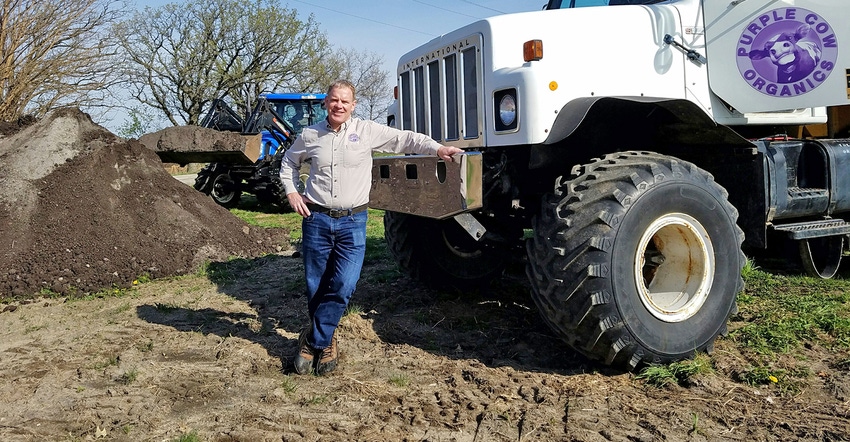May 9, 2017

By Ethan Giebel
“We’re in the make-your-soil-better business,” says Steve Stumbras, an owner of Purple Cow Organics. “There is an increasing awareness about the role soil biology plays in plant health and fertility efficiency. Purple Cow Organics delivers biological solutions to growers — farmers and home gardeners — in the form of compost blends and liquid compost extracts.”
Purple Cow Organics began over five years ago from the merger of two companies — one based in Madison that developed compost for the green industry and the other in Oconomowoc with experience in the agriculture sector. Today, Purple Cow Organics employs nearly 30 people at several facilities in southern Wisconsin.
Compost produced by Purple Cow Organics is unique because it is 100% plant-based. Purple Cow works with a number of communities that collect residual plant materials. Thermophilic composting is the method utilized to create the compost. This method of composting involves bacteria and fungi that break down carbon, which raises the temperature of the compost pile. During the process, the compost is made weed seed- and pathogen-free. Thermophilic composting also allows the product to meet standards for use in organic production.
Wide appeal
Both organic and conventional farmers are utilizing Purple Cow Organics agronomic products. There are preplant, seeding, foliar and postharvest application opportunities for the solid compost blends and liquid products.
“We continue to see more research and results on the role biology plays in fixing nitrogen and cycling minerals,” says Stumbras. “A plant’s ability to produce protein, enzymes and amino acids is driven by balanced minerals and diverse biology. From both a conventional and organic perspective, if you add fertility inputs to something that has beneficial soil biology, your other inputs are used more efficiently.
“Farmers will grow what consumers will purchase,” Stumbras adds. “It’s well-documented that consumers will pay more for food if they support how and why it is grown. As consumers seek out organically grown products more frequently, farmers will fulfill that demand, and we are here to help them build their soil.
“There is a synergy in our organization between what we’ve learned in agriculture and the applications we can provide to home gardeners,” he says. “Home gardeners are getting the benefit of the experience and advancements of more than 20 years of on-farm applications of our products that are used by our farm customers.”
On the retail side, Purple Cow Organics has developed a line of products including compost, potting mixes and fertility products with major distribution throughout the Midwest and beyond. They can be found in independent garden centers and retail locations.
“The word ‘organic’ can be confusing to retail consumers,” Stumbras says. “What isn’t confusing is seeing a friend, relative or co-worker experience a level of success in their garden that they haven’t seen before. It isn’t exclusive to organic. People will try our retail product, and it will deliver results that exceed their expectations. These people become champions of our brand, because they tell the story of our products and how well they work.”
Giebel lives in Baraboo.
You May Also Like




